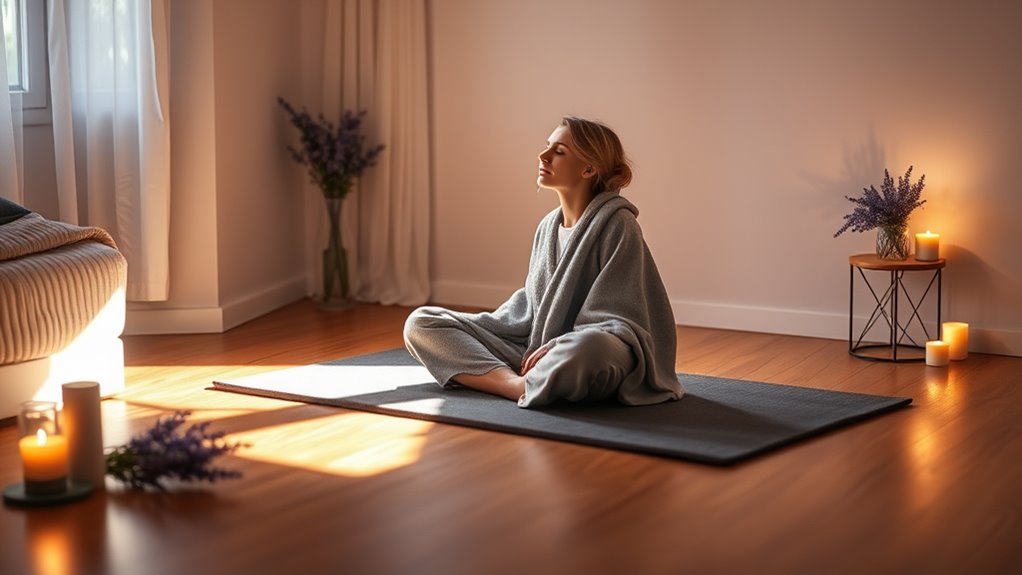The Best Way to Ease Into Sleep Without Overthinking
If you find yourself tossing and turning at night, it’s time to rethink your approach to winding down. Establishing a calming bedtime routine can make all the difference, helping you transition from day to night without the burden of overthinking. Simple changes, like dimming the lights or sipping herbal tea, can set the mood for rest. But there are more strategies you can incorporate to enhance your sleep experience. Let’s explore those options.
Key Takeaways
- Establish a calming bedtime routine with activities like reading or gentle stretching to signal your body to unwind.
- Limit screen time at least an hour before bed to reduce blue light exposure and enhance melatonin production.
- Practice deep breathing techniques to lower stress levels and clear your mind of racing thoughts before sleep.
- Utilize guided meditation or sleep sounds to create a peaceful atmosphere that helps quiet your mind.
- Stick to a consistent sleep schedule, aiming for 7-9 hours of rest, and wake up at the same time daily.
Create a Relaxing Bedtime Routine
How can you transform your evenings into a peaceful prelude to sleep?
Start by creating a relaxing bedtime routine.
Set a consistent time to wind down each night, signaling your body it’s time to ease into sleep.
Incorporate calming activities like reading, gentle stretching, or meditation.
Dim the lights to create a soothing atmosphere and enjoy a warm herbal tea.
Avoid stimulating conversations or tasks that might leave you wired.
Remember, this routine should feel comforting, not like another chore.
With practice, you’ll find it becomes easier to transition from the day’s chaos to a serene night of rest. Additionally, establishing a soothing bedtime routine can significantly enhance your sleep quality.
Limit Screen Time Before Bed
As you settle into your calming bedtime routine, consider the impact of screen time on your ability to unwind.
The blue light emitted by devices can interfere with your melatonin production, making it harder to fall asleep.
Try to limit your screen time at least an hour before bed.
Instead of scrolling through your phone or binge-watching shows, opt for a book or gentle music.
This shift not only helps your mind relax but also signals to your body that it’s time to wind down.
Prioritizing a screen-free environment can significantly enhance your sleep quality. Mindfulness practices can also aid in creating a peaceful mental state before sleep.
You deserve that restful night.
Practice Deep Breathing Techniques
Practicing deep breathing techniques can significantly improve your ability to relax and unwind before sleep. These exercises not only calm your mind but also help reduce stress and anxiety, making it easier to drift off. Let’s explore some simple breathing exercises you can incorporate into your bedtime routine. Additionally, incorporating soothing breathing exercises can further enhance your sleep quality and promote relaxation before bedtime.
Benefits of Deep Breathing
While many people struggle to quiet their minds at night, incorporating deep breathing techniques can significantly enhance your ability to relax and drift off to sleep.
Deep breathing not only calms your nervous system but also promotes a sense of well-being.
Here are a few benefits you’ll experience:
- Reduces Stress: Deep breathing lowers cortisol levels, helping you feel more at ease.
- Improves Sleep Quality: A relaxed state makes it easier to fall and stay asleep.
- Enhances Focus: It clears your mind, allowing you to let go of racing thoughts and distractions.
Embrace deep breathing to transform your bedtime routine.
Simple Breathing Exercises
How can you incorporate simple breathing exercises into your nightly routine to ease into sleep?
Start by finding a comfortable position, either sitting or lying down.
Close your eyes and take a slow, deep breath in through your nose for a count of four.
Hold that breath for a count of four, then exhale gently through your mouth for another count of four.
Repeat this cycle several times, focusing on the rhythm of your breath.
This practice calms your mind and signals your body that it’s time to unwind.
Consistency will help you drift off more easily and peacefully each night.
Use Guided Meditation or Sleep Sounds
What if you could drift off to sleep with just the right sounds or soothing voice guiding you?
Using guided meditation or sleep sounds can help quiet your mind and ease you into a restful state.
They create a calming atmosphere that encourages relaxation. Incorporating breathing techniques into your sleep routine can further enhance the effectiveness of these methods.
Here’s how you can make the most of them:
- Choose calming guided meditations that focus on relaxation and sleep.
- Experiment with sleep sounds like white noise, nature sounds, or gentle music.
- Set a timer to ensure the audio turns off after you’ve fallen asleep.
These techniques can transform your bedtime routine into a peaceful experience.
Keep a Sleep Journal
In addition to using guided meditation or sleep sounds, keeping a sleep journal can significantly enhance your journey to a restful night.
By jotting down your thoughts before bed, you can free your mind from racing thoughts and worries.
Write about your day, your feelings, or even your dreams.
This practice helps you identify patterns in your sleep habits and triggers for stress.
Plus, it creates a calming routine, signaling your brain that it’s time to unwind.
Aim for consistency, and don’t worry about perfection.
Just let your thoughts flow; this simple act can lead to deeper, more restorative sleep.
Incorporating effective journaling prompts into your sleep journal can also help clarify your thoughts and emotions, promoting a sense of tranquility.
Establish a Consistent Sleep Schedule
To improve your sleep, setting a fixed bedtime and waking up at the same time every day can make a significant difference. Consistency helps regulate your body’s internal clock, leading to better sleep quality. If you need to nap, keep it short to avoid disrupting your nightly rest. Incorporating an effective nighttime routine can further enhance your ability to fall asleep peacefully.
Set Fixed Bedtime
Establishing a fixed bedtime can significantly improve your sleep quality, as it helps regulate your body’s internal clock.
By sticking to a consistent schedule, you’ll find it easier to fall asleep and wake up feeling refreshed.
Here are some practical tips to help you set a fixed bedtime:
- Choose a bedtime that allows for 7-9 hours of sleep.
- Gradually adjust your bedtime if it’s significantly different from your current schedule.
- Create a calming pre-sleep routine to signal your body it’s time to wind down.
Making this commitment can transform how you feel each day, so give it a try!
Wake Up Consistently
Waking up consistently each day can have a profound impact on your overall well-being.
It helps regulate your body’s internal clock, making it easier to fall asleep at night.
To establish this routine, set a wake-up time and stick to it, even on weekends.
This consistency reinforces healthy sleep patterns and boosts your mood and energy levels throughout the day.
If you struggle, try placing your alarm across the room to avoid hitting snooze.
Over time, your body will adapt, making mornings feel more natural and less rushed.
Embrace the benefits of a regular wake-up time for a healthier you.
Limit Naps Duration
Consistent wake-up times lay the foundation for a healthy sleep schedule, but it’s equally important to manage your daytime naps.
Keeping naps short can prevent them from interfering with your nighttime sleep.
Aim for these guidelines:
- Limit naps to 20-30 minutes to avoid grogginess.
- Nap earlier in the day to maintain your sleep drive for nighttime.
- Listen to your body; if you’re restless at night, consider skipping naps.





